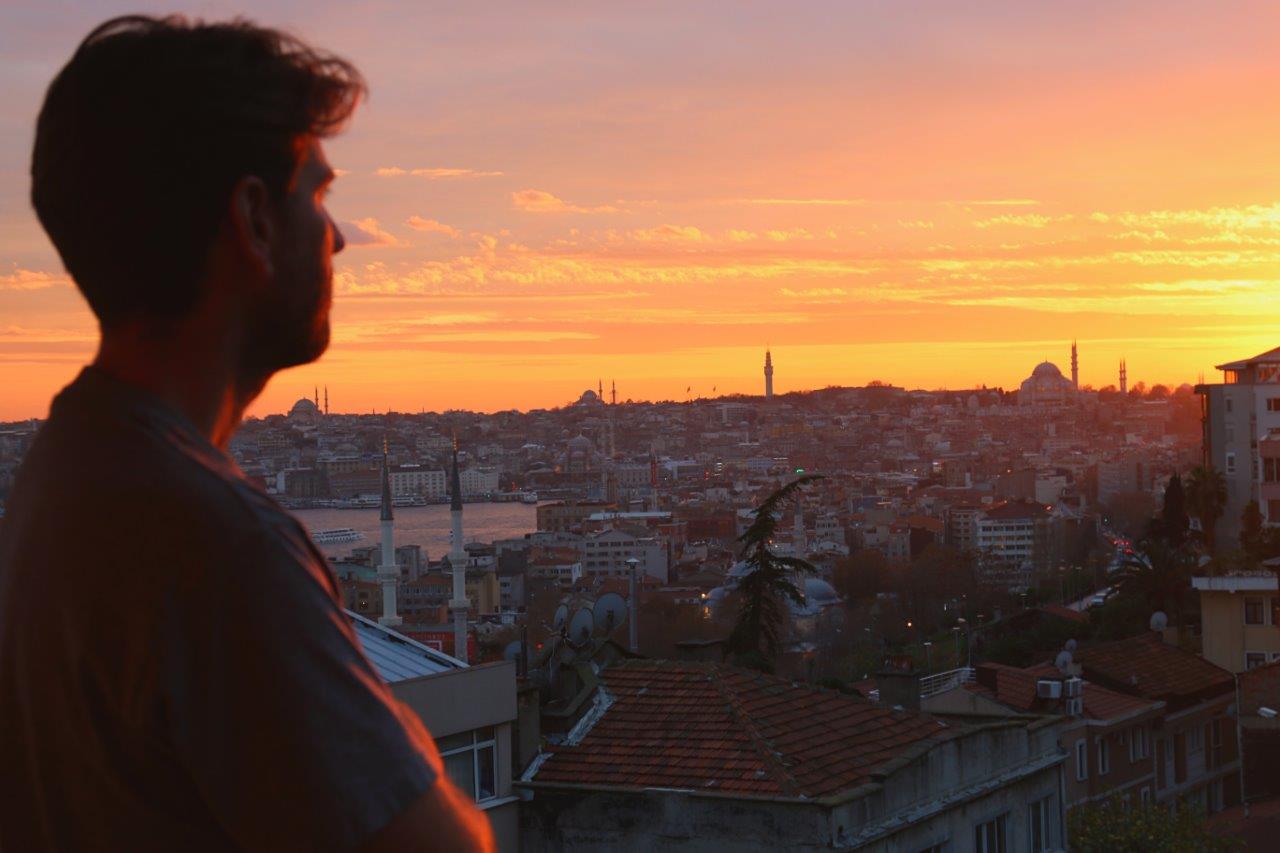
24 Oct 15: East of Eden (Turkey)
View accompanying photo galleries here and here.
Istanbul – Sivrihisar, Turkey (26 Nov – 12 Dec)
Total miles cycled: 2,740 (4,410km)
Thigh status: Two fat ladies
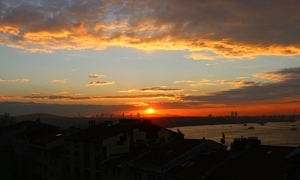
Sunrise over the Bosphorus, taken from window of K & B’s incredible apartment in Istanbul. Takes all the willpower in the world (and running out of chocolate baklava) to leave.
I spend nearly a month in Istanbul. This wasn’t the plan, but it turns out to be a very difficult city to leave. Gastronomically, there’s almost no reason not to stay forever. And physically, it’s a nightmare. The roads are ten lanes wide. The hills are practically vertical. Every time I imagine leaving I have visions of the film Labyrinth, with Maud and I clambering up Escher-like staircases and plunging head first into the Bog of Eternal Stench, while David Bowie the Goblin King looks on in contempt (this may be an exaggeration, but it’s not far off).
It also doesn’t help that I’m having such a good time. My hosts are a lovely bunch, for a start. After a few nights with a Couchsurfing contact in Şişli, a pleasant commercial district in north Istanbul, I move in with my new cycling BFFs, M and M, who are staying in the elite grunge-chic neighbourhood of Beyoğlu.
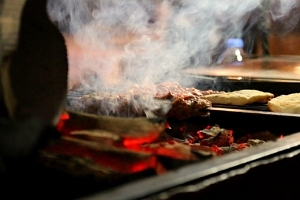
Glorious lamb shish on grill at Zübeyir Ocakbaşı, one of the best kebab joints in Istanbul.
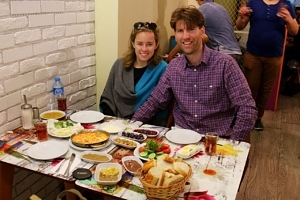
K & B treat me to a breakfast of kings. Four days later I am ready to eat again.
I then impose myself on a lovely American couple, K and B, who have a stunning apartment with panoramic views of the Bosphorus, before catching a ferry to the Anatolian side of the city (where most people live) to spend my final few days with a friendly young chap from the cycling website Warmshowers.
From these friends and other contacts I make during my stay in Istanbul – a medley of lawyers, activists, journalists and NGO workers – I start to piece together my fragmented understanding of Turkish culture and politics. The majority of this involves food, and can be summarised as follows:
– The street snacks are phenomenal and should be eaten at every opportunity. Gorge especially heavily on börek (cheesy pastry), Nutella-slathered simit (sesame dough), midye dolma (rice-stuffed mussels), cig köfte (raw meat & spices) and the counter-intuitively delicious kokoreç (fried sheep intestines & offal).
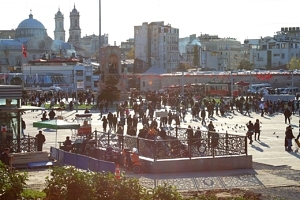
Taksim Square, the site of huge, countrywide protests in May 2013 that denounced governmental corruption & injustice.
– The chocolate baklava is a wanton orgy of the senses and should be bought solely from Sakarya Tatlicisi restaurant, off Istiklal St. The tavuk göğsü can probably be missed, however: a milk pudding made from chicken, which would be pretty scrummy if it weren’t for the fact it tastes quite clearly of chicken.
– The traditional Turkish breakfast is obscene and needs about four hours to do it justice. K and B treat me to a real humdinger, including bread, egg, cheeses, olives, tomatoes, cucumbers, dips (spinach, cheese, tahini, chilli), Nutella, honey, clotted cream and endless tea. It is ‘imperative’ to get the ratio of honey and cream correct, B tells me, or the entire endeavour’s been a waste of time.
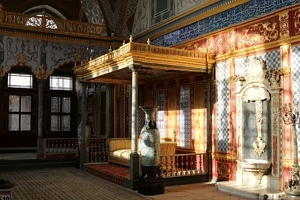
Topkapi Palace harem, the most stunning part of the building. I’m informed that ‘harem’ disappointingly doesn’t mean ‘whore-house’, as I’d thought, but actually a ‘holy place where not everyone can enter’.
I learn a few things that are not food-related too. I learn that everyone is born a Muslim and needs a court order to change this. I learn that weddings last for days and everyone gives gifts made from gold. I learn that tea is not just a drink, but the lifeblood of social cohesion.
I learn sex pests are common, in all shapes and sizes. And that women outside the cities rarely socialise in public. (How would men react if a woman walked into a café, I ask? ‘They’d be delighted,’ I am told. And if it was their wife? ‘They’d be horrified.’)
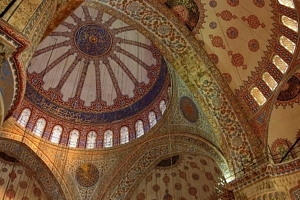
Beautiful Blue Mosque interior.
I learn that Gezi Park, the proposed development of which sparked mammoth countrywide protests in May 2013, is a feeble scrap of turf beside Taksim Square, recalling the disappointment I felt when seeing the pitiable grassy knoll in Dallas, Texas, for the first time in 1999.
I learn that Turkey has responded extremely well to the refugee crisis, dealing effectively with 2.5 million migrants and putting Europe to shame.
I learn that Erdogan has gone power mad but there is nobody even close to competing with him.
I learn that the opposition Republican People’s Party (CHP) has been a damp squib for decades, and it was merely Atatürk’s charisma that maintained its popularity under his rule.
I learn that everyday bribery is dying out, but institutionalised, state-sanctioned corruption grows by the day.
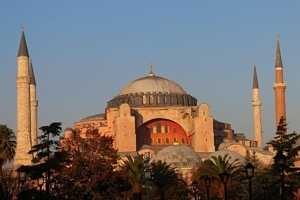
The dreamily dusky pink Hagia Sophia, a symbol of religious tolerance dating from 537: a Greek Orthodox Christian church, later converted into a Catholic cathedral and then an Ottoman mosque. Now a museum.
I learn that the media is heavily controlled and the police are all but untouchable.
I learn that the courts are in the pocket of the state, and human rights a chimera.
I learn first-hand the fear and danger of living in a lawless autocracy when a leading pro-Kurdish lawyer – Tahir Elci – is shockingly killed by an unknown gunman during a public speech about peace and justice just two days after we meet for coffee.
I learn all these things. And the upshot is an impression, deep and abiding, that Turkey is a country in turmoil. Split irreconcilably down the middle – like so many others – the schism is clearly growing: pro-state factions on the one hand, crying religion, stability and security; pro-liberal factions on the other, crying secularism, justice and freedom.
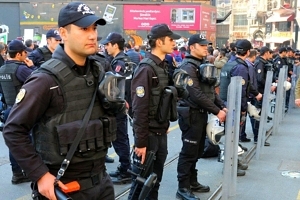
Police guarding the Saturday Mothers group, which meets at 12pm every Saturday in Galatasaray to protest against military violence & impunity following the forced disappearances of their loved ones during the 1980s & 1990s.
I swiftly become both fascinated and disturbed by this conflicted, desperate quagmire of a country. Even the weather unnerves me. During my time in Istanbul, the city seems to have skipped a season, shifting straight from summer to winter. Despite the strides I’ve made in recent weeks as an enigmatic trailblazer of cycle fashion, I realise reluctantly it’s time to replace the socks and sandals with some joylessly conventional trainers. I buy these from Decathlon, alongside thermal leggings, long-fingered gloves and a fleecy top. The Turkish tundra won’t take me down without a fight, g’dammit!
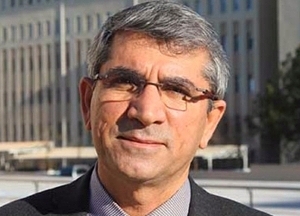
Tahir Elci, a pro-Kurdish human rights lawyer and the chairman of Diyarbakır Bar Association, tells me about the complex Kurdish conflict, and the torture he suffered in prison ten years ago. Two days later he is shot dead in the street during a speech advocating peace.
My exit from Istanbul is far more civilised than my entry. The Sea of Marmara separates me and Bursa, so a 1.5hr ferry helps me evade the urban maelstrom blocking my escape. When I reach the other side, I remount Maud for the final 45km schlepp (with neither helmet nor bungee cords, which I cleverly left behind). Weighed down by over three weeks of rest and kebabs, it’s tough back in the saddle again. The sharp, sunny air seems coated in a frosty glaze, and my limbs hang limp and heavy, like hunks of raw brisket.
When I arrive in Bursa, a woman immediately dashes over to say hello. She’s studying for a PhD in ‘medical English’ at Sheffield University, she tells me – and is no fan of Turkey. ‘There are no rules here,’ she says. ‘Not for traffic, politics, business, anything.’
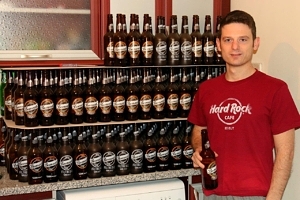
My Bursa host, who seems to enjoy beer. Not many share his enthusiasm in this deeply conservative city.
Everything is based on corruption and nepotism, the woman claims. She doesn’t even have a room at university, as she ‘doesn’t know the right people’. She warns me to ‘be careful of men and thieves’, and tells me that ‘Turks hate other Turks’, as opposed to the Brits, who she views as ‘very kind’. It makes me wonder about the impulse to romanticise cultures other than our own. Do we view them more favourably due to their unfamiliarity, just as we might prefer a passing acquaintance to a live-in relative whose bad habits and bodily functions have long destroyed any residue of respect?
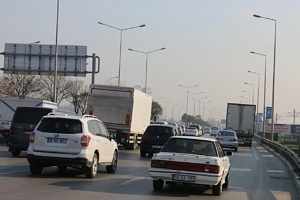
The quiet road to Bursa. I stick to the hard shoulder, which trucks occasionally avoid.
Bursa is unusually both a university town and one of Turkey’s most religious cities. Most women are dressed in black abayas and colourful headscarves, and look rather old. My Couchsurfing host, O, doesn’t seem to fit in well here: an aggressively anti-Erdogan atheist who sees the government as a bunch of mercenary crooks. Over an Iskender kebab – Bursa’s traditional dish: a doner with tomato sauce, yoghurt and chopped up pita bread, and maybe one of the most beautiful things I’ve ever seen – he gives me his take on his country.
‘If there was just a semblance of justice here, that would be enough,’ he says. ‘But there isn’t.’ Wouldn’t there be chaos without Erdogan, though, I ask? ‘Yes,’ he replies. ‘I choose chaos.’
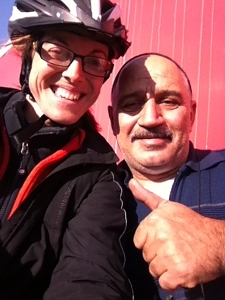
A friendly truckie who pulls over to give me a satsuma. What a guy.
I hit the road the next day. It’s an unpleasant trudge along a six-lane highway, and bitterly brisk. After a nasty 10km hill, I stop outside a shop and am invited in for tea, bread and olives. The sweet owner gabbles away pleasantly and incomprehensibly as I eat, a slight shadow momentarily flicking across her face when I explain I don’t have children. As I leave, she gives me a big smacker on the cheek and an armful of apples. What a sweetheart!
I arrive in Inegol in the early afternoon. It’s busy and grotty, but is redeemed by a lovely middle-aged man who insists on buying me lunch: a feast of lamb stew, chickpeas, yoghurt and rice pudding. He then finds me a discounted room in a new apartment block – and, his duty done, slips away. ‘Beware of men and thieves,’ I remind myself; yet curiously, neither has proved a problem as yet.
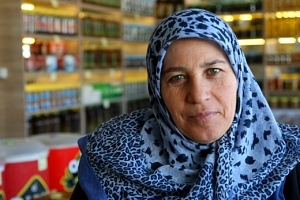
Generous shopkeeper who feeds me tea, cheese, olives and bread after a long uphill slog, and gives me a big hug & smacker as I leave. What a gal.
The next morning I discover my bike has developed a puncture overnight. I spend 30 mins peevishly fixing it, casting accusing eyes on the suspiciously cheery old crone vacuuming nearby, before hitting the road to Eskisehir. It’s a long 110km slog, and I spend the entirety of it grumpy and numb in the extremities. Why did nobody warn me Turkey was a cold country, I mutter to myself. How the hell was I to know?
I like Eskisehir immediately. It’s a thriving university town, and a haven of liberalism in a largely conservative region. The old Ottoman district of Odunpazari is a charmingly preserved Technicolor palette of autumnal reds, greens and yellows (see pic), as well as the world’s only trade centre for meerschaum, a soft white stone used to make pipes and jewellery.
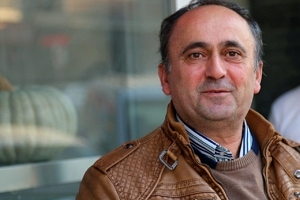
Yet another wonderful chap who buys me lunch and helps me find cheap lodgings in Inegol. Turkish kindness wraps about me like a comfort blanket, warm & woolly.
Bikes are clearly a big part of the culture here too. My Warmshowers host, A, goes out every Monday with a local cycling group. ‘A few years ago you wouldn’t see anyone on a bike here,’ she says. ‘Now there are loads.’
A is a 30-year-old university English teacher, married to a private maths tutor. Both are atheists. She used to be religious, she tells me, until Erdogan ‘turned it into something hateful’. The 2013 protests were huge, she says. ‘Fear was broken. Gay people and minorities mingled with the crowds and were accepted. It changed attitudes forever.’
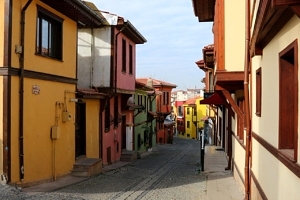
Odunpazari in Eskisehir’s old town: touristy, but cheerful, colourful and authentic.
After buying an array of meerschaum Christmas gifts and posting them home, Maud and I take to the road once more. The highway is stale and relentless, with a chunky hard shoulder strewn with a perplexing amount of string and broken glass. Lorries thunder to my left, while forlorn brown fields unfurl to my right. Despite my multiple layers, an icy chill writhes and coils about my bones.
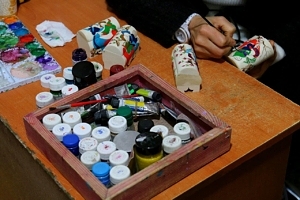
Eskisehir is the only place in the world where meerschaum is mined, so its streets are filled with artists, sculptors and merchants.
After about 100km, I turn off into a small town called Sivrihisar. A hotel doesn’t look hopeful as I trawl the deserted streets with their bleak tenements and corroded dumpsters – but help is soon at hand, it seems. Moments after I sit on the curb to ponder my meagre options, a young policeman approaches me and (speaking via Google Translate) offers to find me a suitable place. He then, wonderfully, buys me a köfte kebab in the local café before darting off to save the day.
I wait in the toasty café for his return, which simmers with the dull murmur of young men playing cards. It’s cosy and welcoming, but I can’t help feeling an essential lifelessness here, a sensation of blood stilled in the vein. Everything seems muted, somehow; monochrome. Later, two girls with uncovered hair, short skirts, black leggings and platform boots arrive to play backgammon, but the atmosphere remains subdued. I am thankfully left alone.
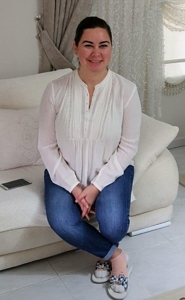
My Eskisehir host, a very friendly 30-year-old English teacher and cycling enthusiast.
After the policeman returns, I am taken to his colleague’s small apartment nearby. The colleague is a polite, earnest 28-year-old who gives me tea and a pair of provocative lion slippers to warm my toes. He then cooks an incredible feast of chicken, rice, beef stew, stuffed vine leaves and pida (minced lamb pizza).
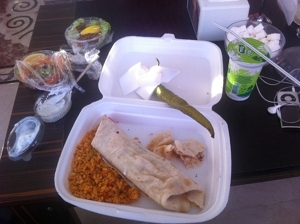
Police take me under wing in Sivrihisar and treat me to a kebab lunch. Is anything more soul-rejuvenating than a complimentary kebab?
As we eat, my policeman calls my mobile. We talk hesitatingly over Google Translate, and at first I’m touched by his concern. Then his true motives emerge. ‘How old are you?’ he asks, out of the blue. And then, moments later: ‘You like spend night with me?’ Taken aback, I bark a few unrepeatables and hang up.
Afterwards I’m unsure if I’m more angry or amused. Here are the extremes of Turkish culture in a nutshell, I think to myself: the warmth and hospitality on the one hand; the untempered male libido on the other. But he is a naive, small-town 20-something in a sexually repressed Islamic state — and (more importantly) he bought me a kebab. I can probably forgive him an errant hormone or two.
Over dinner, I grill my host over Google Translate. Is he Muslim? ‘Of course.’ Does he pray? ‘Once a day.’ Does he like Erdogan? ‘He’s ok. I don’t like politics.’ Are you married? ‘No. I’m picky.’ And your friends? ‘Most were married by 22.’
When I get on to ISIS, he livens up. ‘They are murderers,’ he writes. ‘Terrorism has no race, religion or language.’ After a few more ISIS-related questions, he bristles slightly. ‘Your questions show you have no idea about the real Turkey,’ he tells me.
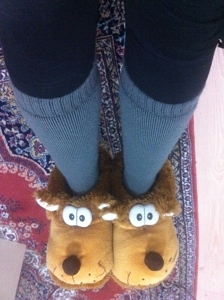
Pair of sensual lion slippers, courtesy of my young police host in Sivrihisar. Almost makes up for the light sexual harassment from his colleague.
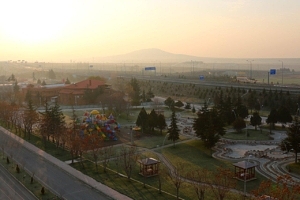
View of park from host’s balcony. Quite pretty in dewy dawn light.
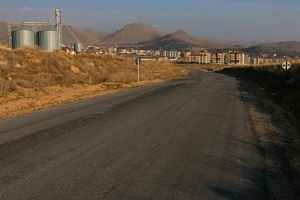
The outskirts of the thriving metropolis of Sivrihisar, population 10,000.
He’s right, of course. Is there even such a thing? Adele’s quest to find the ‘real India’ in A Passage to India results in a nervous breakdown and ceaseless echo that drives everyone deranged. But I am keen to learn what I can – and just hope I can stop thinking about kebabs and chocolate baklava for long enough to focus on the task at hand.
View accompanying photo galleries here and here.
Follow my journey on Instagram at bexio8, Twitter at reo_lowe or Facebook at bexbicyclediaries.


kerem
Posted at 10:57h, 25 OctoberC’mon, the tavuk göğsü IS awesome!
reol8
Posted at 11:28h, 26 OctoberIt would be awesome, if it weren’t for that fowl aftertaste.
Dick Joyce
Posted at 18:50h, 26 OctoberGreat! Can you, by the way, throw any further light on this ‘live-in relative with bad habits and bodily functions’?
reol8
Posted at 14:22h, 27 OctoberI can’t divulge my sources, I’m afraid. But he claims the problem lies in the genepool! I am very sceptical…
Dick Joyce
Posted at 10:02h, 28 OctoberIs that a public baths close to Finsbury Park?
Sanne
Posted at 01:07h, 09 MayWhoever edits and pulbeshis these articles really knows what they’re doing.
BestJill
Posted at 19:37h, 16 AugustI have noticed you don’t monetize your website, don’t waste your traffic,
you can earn extra cash every month. You can use the best adsense
alternative for any type of website (they approve all websites), for more info simply search in gooogle: boorfe’s
tips monetize your website